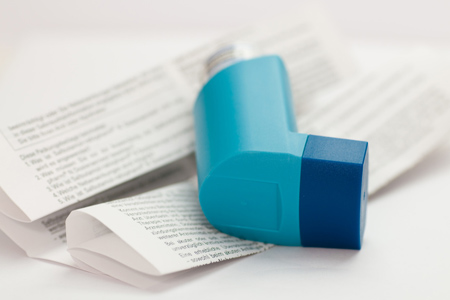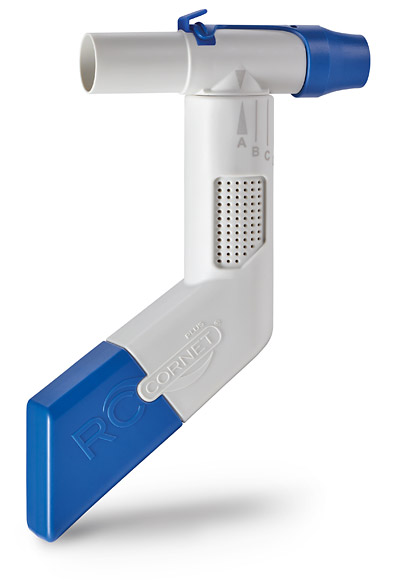Bronchial asthma – therapy
Medication-based therapy for bronchial asthma
The focus of all therapeutic measures for bronchial asthma is medication-based treatment. The active agents are often administered in the form of a medicated spray (metered-dose inhaler).
There are 3 groups of drugs, in particular, that allow for a relatively symptom-free life for patients:

- Bronchospasmolytics dilate the bronchi and relieve the cramping of the bronchial musculature (bronchospasms) during an asthmatic attack.
- Corticosteroids are drugs containing cortisone that have an anti-inflammatory effect. Just like bronchospasmolytics, they are administered through inhalation in most cases.
- Secretolytics are secretion-loosening agents that dilute stubborn phlegm and ease expectoration.
Auxiliary devices for bronchial asthma
Peak-Flow-Meter
A peak flow meter is used for regular measurement of the peak flow, i.e. the maximum flow rate during exhalation, and is part of the basic equipment of chronic pulmonary patients. Based on the progression of values obtained, patients can monitor the course of their condition and identify any worsening early on.
Inhalation devices (spacers)
Spacers such as the RC-Chamber® improve and facilitate the use of metered-dose inhalers. Children and older asthma patients, in particular, often have difficulty coordinating the inhalation and the burst of spray. Studies have shown that the additional use of a spacer results in more active agent penetrating the target area.
Respiratory physiotherapy with PEP / OPEP systems
With the use of PEP / OPEP systems such as the RC-Cornet®, asthma patients can conduct easy and effective training for the airways. Exhaling into the device generates fluctuations in pressure and flow that are transmitted to the bronchial system. This process dilates the bronchi and physically eases expectoration.
RC-Chamber® spacer – Use and method of action
You are currently viewing a placeholder content from YouTube. To access the actual content, click the button below. Please note that doing so will share data with third-party providers.
More InformationRC-Cornet® PLUS
The PLUS for your quality of life
Hyposensitisation
Read more on the topic of bronchial asthma:
Subscribe to our
BREATHE EASY Newsletter
Tips and information on healthy airways!
- for all who wish to breathe better
- free of charge and convenient e-mails
- compact newsletter once a month
For all those who deal with pneumological topics related to the respiratory tract in a professional context, please find here the subscription to the CEGLA FACHNEWSLETTER.

